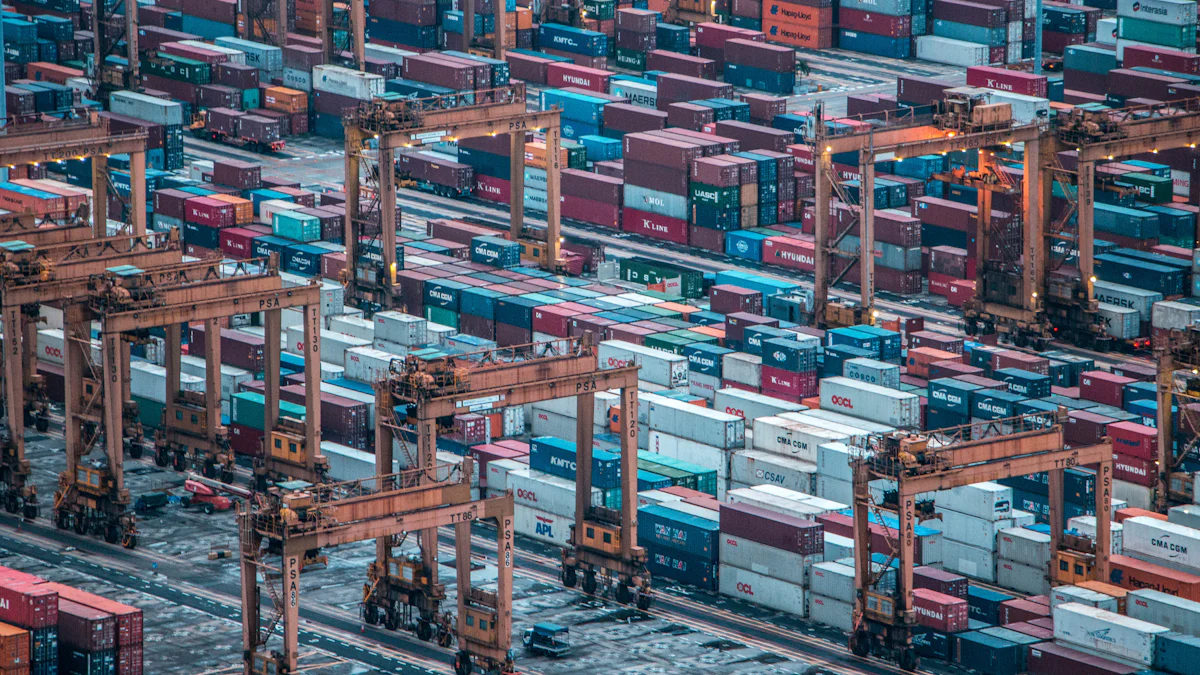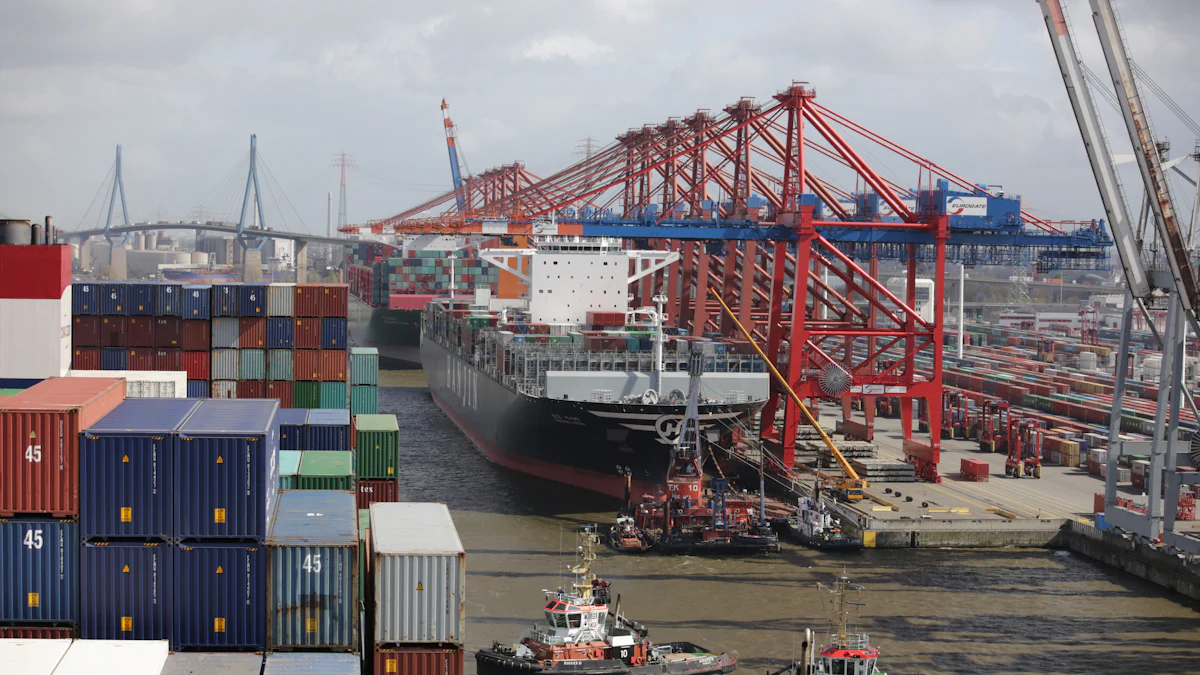The Future of Supply Chains in Japan

Supply chains play a crucial role in Japan's economy, ensuring the seamless flow of goods and services. The modern supply chain in Japan is undergoing a transformation, driven by technological advancements such as IoT and big data analytics. These innovations enhance visibility and transparency, essential for efficient operations. Japan's logistics industry, recognized globally for its leadership, continues to evolve with a focus on sustainability and efficiency. As the market grows, the emphasis on innovation and technology will shape the future, ensuring Japan remains at the forefront of global supply chain management.
Current State of Supply Chains in Japan
Overview of Japan's Supply Chain Infrastructure
Key Components and Players
Japan's supply chain infrastructure stands as a testament to its technological prowess and efficient management practices. The country boasts a robust network of manufacturers, distributors, and logistics providers. Key players include major corporations like Toyota, Mitsubishi, and Hitachi, which drive innovation and efficiency. These companies leverage advanced technologies to streamline operations and enhance productivity. The integration of IoT and big data analytics plays a crucial role in optimizing supply chain processes, ensuring timely delivery and reducing costs.
Recent Developments and Trends
Recent trends in Japan's supply chain landscape highlight a shift towards sustainability and resilience. The government encourages companies to diversify their supply chains, reducing reliance on China. This strategic move aims to mitigate risks associated with geopolitical tensions and economic dependencies. Japanese firms increasingly adopt green logistics practices, focusing on reducing carbon footprints and promoting environmental sustainability. The emphasis on reshoring production and enhancing domestic capabilities further strengthens Japan's supply chain resilience.
Challenges Facing Japan's Supply Chains
Economic and Political Factors
Japan's supply chains face several economic and political challenges. The ongoing US-China trade war has prompted Japanese firms to reassess their supply chain strategies. Diversification efforts aim to reduce economic dependence on China and safeguard against unstable political relations. Additionally, Japan's aging population poses a challenge, as it affects labor availability and productivity. The government actively seeks to attract foreign investment and talent to address these issues and maintain economic growth.
Environmental and Sustainability Concerns
Environmental sustainability remains a pressing concern for Japan's supply chains. Companies strive to balance economic growth with environmental responsibility. The adoption of sustainable practices, such as green logistics and circular economy initiatives, reflects this commitment. Japan's focus on reducing carbon emissions and promoting renewable energy sources aligns with global sustainability goals. By prioritizing environmental concerns, Japan aims to create a more sustainable and resilient supply chain ecosystem.
Emerging Trends in Supply Chain Management

Technological Innovations
Role of AI and Automation
Artificial Intelligence (AI) and automation are revolutionizing supply chain management in Japan. Companies utilize AI to optimize resource usage and enhance transportation efficiency. By improving supplier collaboration, AI reduces the carbon footprint of supply chains. Predictive analytics and machine learning, key AI applications, improve demand forecasting and supplier assessment. These technologies help reduce waste and optimize resource use. However, challenges such as evaluating return on investment (ROI) and considering long-term benefits persist. Ethical implications and the need for developing digital competencies also pose hurdles.
Impact of IoT and Big Data
The Internet of Things (IoT) and big data significantly impact Japan's supply chains. IoT devices provide real-time data, enhancing visibility and transparency across the supply chain. This data helps companies monitor inventory levels, track shipments, and predict maintenance needs. Big data analytics processes this information, offering insights that drive decision-making. Companies can identify patterns, forecast demand, and optimize logistics operations. These technologies enable more efficient and responsive supply chains, ensuring timely delivery and cost reduction.
Shift Towards Sustainable Practices
Green Logistics and Transportation
Japanese companies increasingly adopt green logistics and transportation practices. They focus on reducing carbon emissions and promoting environmental sustainability. By using energy-efficient vehicles and optimizing delivery routes, companies minimize their environmental impact. The shift towards electric and hybrid vehicles further supports these efforts. Green logistics not only benefits the environment but also enhances operational efficiency. Companies that prioritize sustainability often experience improved brand reputation and customer loyalty.
Circular Economy Initiatives
The circular economy concept gains traction in Japan's supply chains. Companies implement initiatives that promote recycling, reuse, and resource efficiency. By designing products for longevity and recyclability, they reduce waste and conserve resources. These initiatives align with global sustainability goals and contribute to a more resilient supply chain ecosystem. Companies that embrace circular economy practices often see cost savings and increased competitiveness. As Japan continues to lead in sustainable supply chain management, these trends will shape the future of the industry.
Modern Supply Chain in Japan

Adoption of Advanced Technologies
Blockchain for Transparency and Security
In the modern supply chain in Japan, blockchain technology plays a pivotal role in enhancing transparency and security. Companies use blockchain to trace products from origin to destination, ensuring quality control and reducing counterfeiting. This technology allows for effective supplier negotiations by providing verifiable data on product history. DLT Labs, a leader in blockchain solutions, revolutionizes supply chain management by streamlining operations and improving data transparency. By adopting blockchain, Japanese manufacturers achieve digital transformation, which enhances the reliability and efficiency of their supply chains.
Robotics and automation significantly boost efficiency in Japan's supply chains. Companies deploy robots for tasks such as sorting, packaging, and transporting goods. This reduces human error and increases productivity. Automation technologies optimize warehouse operations, enabling faster order fulfillment and reducing labor costs. By integrating robotics, Japanese firms maintain a competitive edge in the global market. The use of automation not only improves operational efficiency but also supports the sustainability goals of reducing energy consumption and waste.
Robotics and automation significantly boost efficiency in Japan's supply chains. Companies deploy robots for tasks such as sorting, packaging, and transporting goods. This reduces human error and increases productivity. Automation technologies optimize warehouse operations, enabling faster order fulfillment and reducing labor costs. By integrating robotics, Japanese firms maintain a competitive edge in the global market. The use of automation not only improves operational efficiency but also supports the sustainability goals of reducing energy consumption and waste.
Building Resilient and Agile Supply Chains
Diversification of Suppliers
To build resilience, Japanese companies diversify their supplier base. This strategy reduces dependency on a single source and mitigates risks associated with geopolitical tensions or natural disasters. By sourcing materials from multiple regions, firms ensure a steady supply of goods even during disruptions. Diversification also fosters competition among suppliers, leading to better pricing and quality. This approach strengthens the overall supply chain, making it more adaptable to changing market conditions.
Risk Management and Contingency Planning
Effective risk management and contingency planning are crucial for maintaining agile supply chains in Japan. Companies identify potential risks and develop strategies to address them proactively. This includes creating backup plans for critical operations and establishing communication protocols for crisis situations. By conducting regular risk assessments, firms can anticipate challenges and respond swiftly. Contingency planning ensures that supply chains remain operational during unforeseen events, minimizing disruptions and maintaining customer satisfaction.
Case Studies and Examples
Successful Implementations in Japan
Company A's Use of AI in Logistics
Company A has successfully integrated AI into its logistics operations, showcasing the transformative power of technology. By employing AI-driven decision support systems, the company optimizes resource usage and reduces its carbon footprint. This approach not only results in significant cost savings but also enhances operational efficiency. AI helps in predicting demand and managing inventory, ensuring timely deliveries and minimizing waste. The company's commitment to sustainability through AI demonstrates the potential for other businesses to follow suit.
Company B's Sustainable Supply Chain Practices
Company B stands out for its dedication to sustainable supply chain practices. The company has implemented a comprehensive strategy that includes green logistics and circular economy initiatives. By focusing on recycling and resource efficiency, Company B reduces waste and conserves resources. This approach aligns with global sustainability goals and enhances the company's reputation. The successful implementation of these practices highlights the importance of environmental responsibility in modern supply chains.
Lessons Learned from Global Leaders
Insights from International Case Studies
Global leaders in supply chain management offer valuable insights into best practices. Companies worldwide have adopted AI to enhance supplier assessment, going beyond cost considerations to focus on long-term sustainability. These international case studies reveal the importance of integrating technology to improve decision-making processes. By learning from these examples, businesses can develop more resilient and efficient supply chains.
Applicability to the Japanese Context
The lessons learned from global leaders hold significant relevance for Japan. Japanese companies can apply these insights to enhance their supply chain strategies. By adopting AI and sustainable practices, businesses can improve efficiency and reduce environmental impact. The focus on innovation and adaptability ensures that Japan remains competitive in the global market. As companies embrace these strategies, they contribute to a more sustainable and resilient supply chain ecosystem in Japan.
Japan's supply chains are evolving rapidly, driven by technological innovations and sustainable practices. Key points include the integration of AI and IoT, which enhance efficiency and transparency. Companies adopting green logistics and circular economy initiatives see long-term benefits, such as cost savings and improved brand reputation. Innovation and adaptability remain crucial for future growth. As Japan continues to lead in supply chain management, embracing these changes ensures resilience and competitiveness. The future of supply chains in Japan looks promising, with a strong focus on sustainability and technological advancement.
See Also
Tomorrow's Logistics Revolutionized by AI in the Supply Chain
Exploring Global Consumer Demands: A Deep Dive into Jusda's Supply Chains
Industries Transformed by Cloud-Based Solutions in the Supply Chain
Embracing Tech-Driven Solutions: Navigating Change in the Supply Chain
Overcoming Globalized Challenges: Solutions for Supply Chain Expansion
